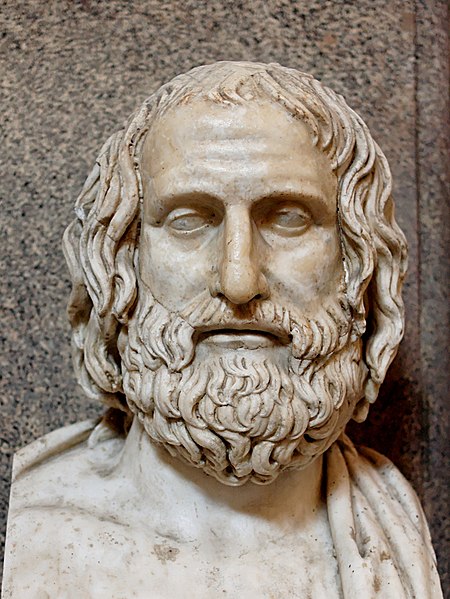This is the second part of a multi-part article (see part 1) about why I am a conservative. As part of this series, I will explore the various fundamental roots of my own conservatism.
The ancient Greek, Euripides, stands as one of the anchors of my conservatism. What do I mean by an anchor? Well, just as an anchor on a ship keeps it from drifting too far away from the safety of the harbor, so the founding documents of democracy keep democratic governments and their people from drifting too far from the fundamental principles of the democratic ideal or from republicanism. Only with clear direction and established charts will a conservative haul anchor and move the ship to new waters. Hauling anchor in rough waters or with no idea of direction is risky or even dangerous to the ship. Also, once the ship is moving, the anchor shouldn't be thrown away because it is no longer necessary. The anchor will always serve a useful purpose.
By way of contrast, modern liberalism doesn't see a need for anchors. Instead, modern liberals consider the anchor as necessary only while the ship was being built. When the ship sails along with no troubles, the anchor seems to be merely extra weight which keeps the ship from reaching its full potential. Modern liberalism views historical anchors as stifling, outdated, outmoded, unnecessary, or even immoral.
That's enough of the ship analogy. I'll get back to my anchors of conservatism. First is the democratic ideal.
My Greek namesake, Euripides, was a playwright who lived in the 5th Century B.C. In his play, The Suppliants, he has the hero Theseus make this statement about democracy:
Nothing is worse for a city than a tyrant. Wherever he rules, the law does not. In his hands there is no law that rules over all alike. But where the laws rule, all--rich and poor, powerful and weak--are equal before them....How can the city survive and prosper, where its ruler stifles all initiative and uses his sword like a scythe, cutting down its youths like the flowers of spring? Why work and save for the sake of your children, only to have the tyrant take it all away?...I would rather die than have my children be subjected to such arbitrary power. (Translated by Terrence Ball.)What possible use can a document, 2500 years old, have on the modern world? I find several compelling self evident truths within this one paragraph.
Tyrants
First, tyrants are bad. Why? Because a tyrant does not rule by law, but by his own whim. There is no legal protection from a tyrant. In a modern context, the tyrant can be a single person - a dictator - or an group of a few rulers - an oligarchy. Most governments are oligarchies - rule by the few. The US is one of the few governments that at least pays lip service to being a government of the people. Yet, as I see it, the US government is rapidly shifting the balance of power away from the people, and the rule of law, to an oligarchy and the rule of tyranny. Here are a few examples of this shift from some recent news stories:
Rasmussen Poll: Just 53% Say Capitalism is Better than SocialismTaken by themselves, each of these stories doesn't look like much. Taken as a whole, they indicate a modern liberal trend away from the anchor of the democratic ideal, toward more government control, and toward tyranny.
Gingrich: Iowa Ruling Shows Judicial Arrogance
Obama Wants to Control the Banks
Fighting for Gun Rights
Rule of Law
The rule of law can only happen when a country maintains a constitution and adheres to it, despite the pressures of special interest groups. All individuals must be equal under the law. In the conservative ideal, special interests, lobbies or factions must be controlled and not allowed to derail the rule of the people. I will discuss, in a later installment, what James Madison had to say about factions. Here, the important concept is that factions must be controlled.
Protecting the Young
One of the very important anchors of society, any society, is its young. Just as the ancient Euripides was afraid that tyrants would destroy the youth of Athens, so modern conservatives fear the wanton destruction of America's young. Two modern liberal ideals are aimed directly at the young in our society: abortion and the destruction of families. This current essay is not the place to argue the finer points of these, especially since many of my other posts tackle these very problems. I only point out that the idea of the protection of the youth is an ancient ideal and an anchor to conservatism. On the young rests the hopes of the future.
Private Property
Euripides also makes reference to the importance of the protection of private property. He says, "Why work and save for the sake of your children, only to have the tyrant take it all away?" The fear, of course, is that government will take away all property. Conservatism, however, also understands that taxes, especially onerous taxes or those imposed without the consent of the governed, are akin to tyranny. Conservatives view government taking property at any time as suspect. When a government takes private property with no better reason than someone has too much of it, or someone has mishandled it, that also borders on the edges of tyranny.

0 comments:
Post a Comment